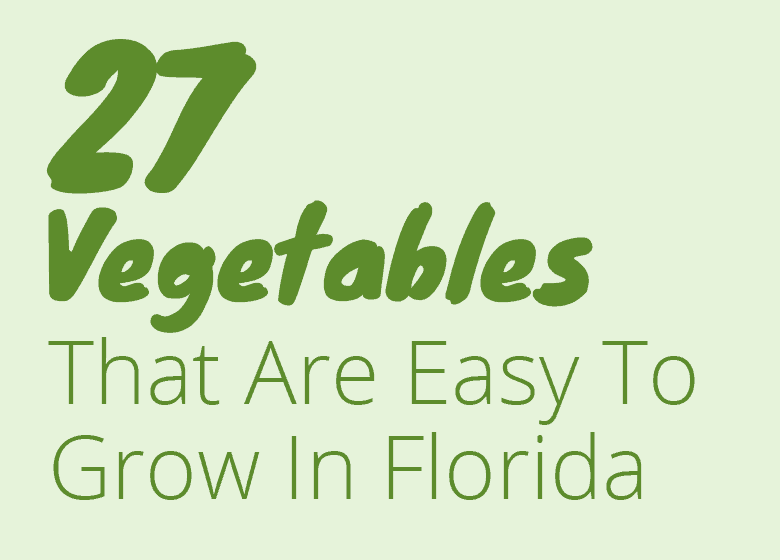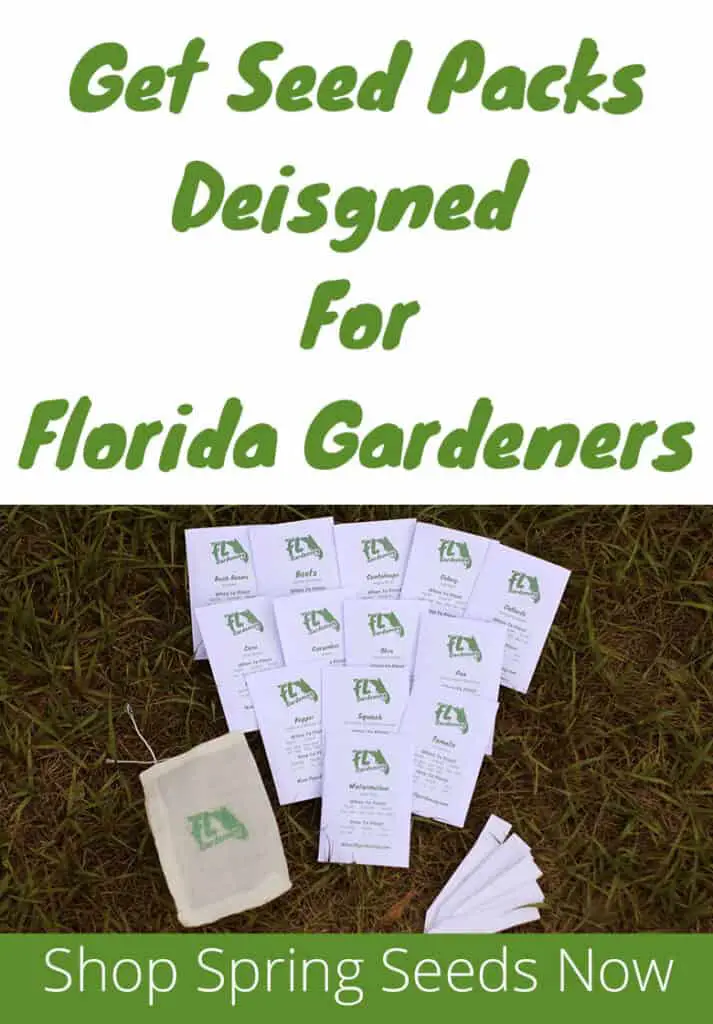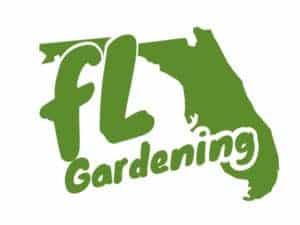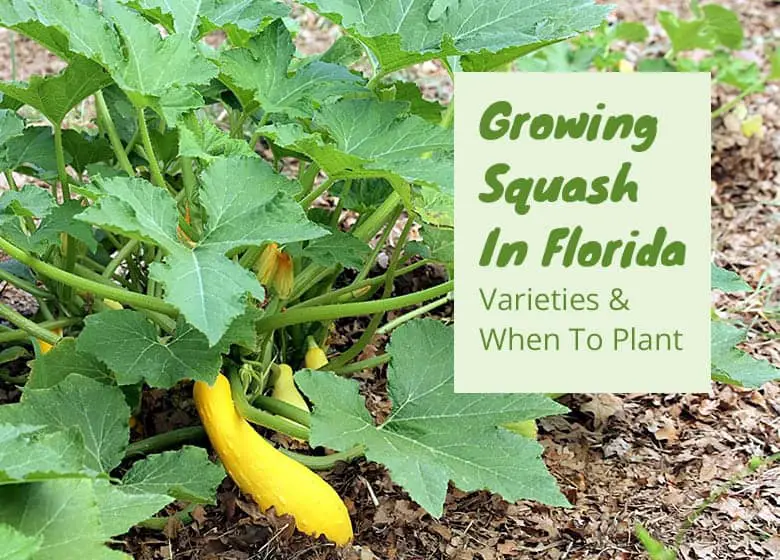
Supposedly it’s a breeze to grow squash in Florida. It’s one of the easiest to grow vegetables according to a few gardening books.
Growing squash in Florida is easily done if planted during the early spring and fall time. South Florida can even plant in the “winter” time. Good varieties of squash for Florida are Chayote, Crookneck, Black Beauty, and Waltham.
I say supposedly up top because I’ve personally never had really good luck with growing squash.
I’ve tried both winter and summer squash without much luck, My plants usually get hit with mildew issues or worms.
Don’t let me discourage you.
You might have no problem at all growing squash, read on to find out more varieties, specific planting times and how to battle pests and diseases you may see.
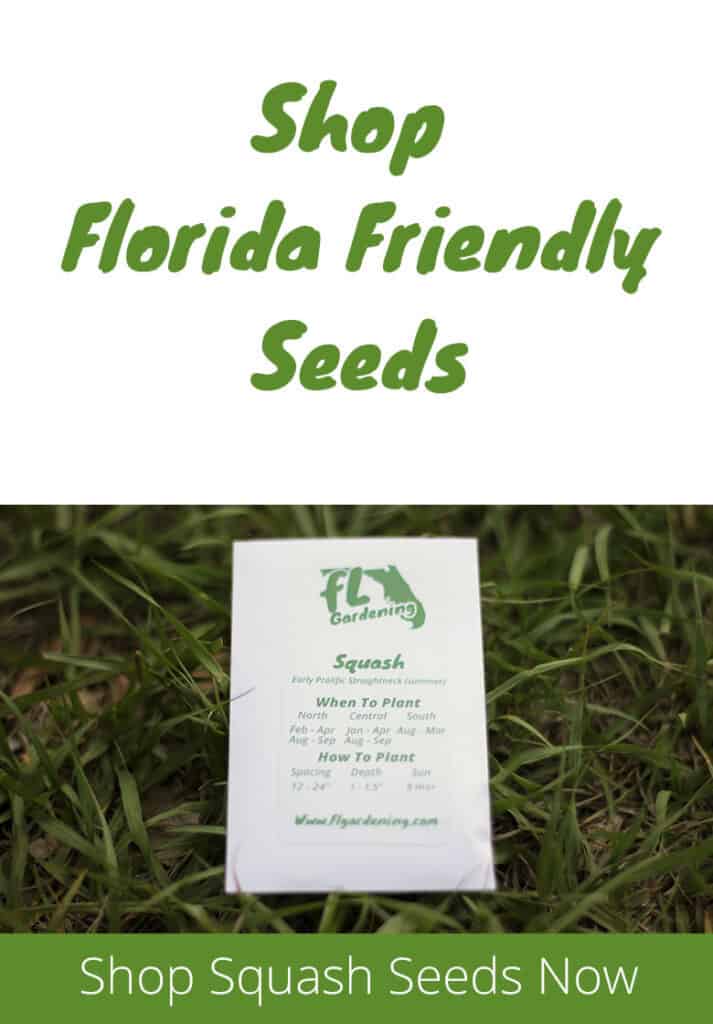
Florida Friendly Squash Varieties
Let’s start by breaking squash into two separate groups.
Summer and Winter.
Summer squash is usually grown as a bush and has thin-skinned vegetables. Winter squash is usually grown as a vine and has thick-skinned fruit.
When you hear summer squash think of things like zucchini and when you hear winter squash you should think of things like pumpkins.
Summer Squash
- Black Beauty
- Chayote
- Cocozelle
- Early Prolific
- Early White Scallop
- Spineless Beauty
- Summer Crookneck
The most popular vegetable in the summer squash group has to be the zucchini. Black Beauty, Chayote, Cocozelle, Spineless Beauty are all zucchini varieties.
Chayote is probably the lesser-known squash on this list but it grows quite well in Florida. It is actually the only summer squash on this list that grows as a vine.
Winter Squash
- Acorn
- Butternut
- Seminole
- Spaghetti
- Waltham
The Seminole squash is supposed to be one of the easiest vegetables to grow in Florida. It was grown by the native Americans here and it produces loads of fruit and doesn’t require much care.
It’s a winter type squash so expect the plant to be a Viner and one that makes thick-skinned fruit.
When To Plant Squash In Florida
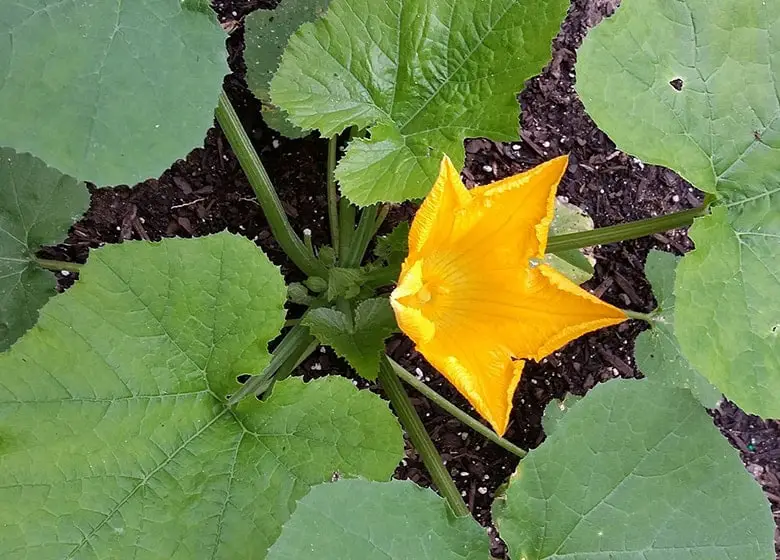
The best time to plant squash in Florida is during the early spring and again in the Fall. For those that live in South Florida, you can even plant during the “winter” time.
Just because the names suggest summer and winter, that doesn’t mean that you should plant them during those times.
Planting Squash In Florida
- North Florida: February – April & Aug – Sep
- Central Florida: Jan – April & Aug – Sep
- South Florida: Aug – Mar
Squash does not enjoy our intense Florida summer, only a few vegetables do.
Where To Plant Squash In Florida
Plant squash in an area that gets plenty of sunlight. the plant needs at least 6-8 hours of sun in order to be productive.
You want the plant to be in compost-rich, well-draining soil. If you are planting directly into the dirt. I always recommend at the very least adding compost and a thick layer of mulch.
Mulch goes a long way when keeping your plant happy.
If you are planting into a pot or a raised bed I’ve always had good luck with a mix like this:
- 40% Coco coir
- 40% Compost 20% perlite
- Worm castings
- Mykos
Most of these things can be found at your local hardware store. The mykos and the coco coir will probably be a bit harder to find.
You can always replace the coco coir with peat moss. I like coco coir better because it does not make your soil acidic over time like peat does. And the farming practices of peat moss are also unsustainable.
Mykos is not 100% necessary but I’ve seen good results with it. It helps your soil have beneficial fungi in it. This creates a web of nutrient sharing goodness.
Fertilizing
Fertilize squash with something like Tomato-tone(Check price), a basic vegetable fertilizer. It’s a 3-4-6 fertilizer.
The three numbers that you see are the Nitrogen(N), Phosphorus (P), and Potassium(K) values. Each nutrient in your fertilizer does something different for your plant.
Nitrogen helps your plant produce green leafy growth. Phosphorus helps your plant with root growth and flower production. Potassium is a good overall health booster.
Harvesting Squash
Winter squash grows much slower than summer squash. Typically, winter squash will take anywhere from 85 – 120 days in order to grow to maturity. Summer squash usually takes 40-50 days in order to be fully mature.
When harvesting squash you should also use a good pair of shears or a sharp knife.
You want to avoid pulling and tearing the fruit from the plant.
According to Robert Bowden, author of Florida Fruit And Vegetable Gardening, Squash that has at least an inch on stem left will store for longer periods of time.
For other gardening books that I found helpful check this out.
Pests And Diseases
I’ve had plenty of experience with this section. It seems like every time I try to grow squash they got hit by mildew issues.

Squash is most commonly affected by downy and powdery mildew.
Another very common problem with squash is stem borers. They are worms that dig into the hollow stems of squash plants.
If you spray your plant with high-quality neem oil (Check price)you should avoid most of these problems. Neem oil has been known to help with downy and powdery mildew. It’s also known to deter pests and often kill them if ingested.
Stem borers can still be a problem if they bore into the stem before eating the sprayed plant. to stop stem borers after they have already chewed their way through you must cut off the infected part of the plant.
If the remaining stem that is still attached to the plant is big enough, try planting it into the ground. this should tell the plant to produce roots on that stem.
Grow Squash In Florida
- Plant in the early spring and early fall. Those in South Florida can plant in the wintertime as well
- Florida friendly summer squash varieties are Black Beauty, Chayote, Cocozelle, Early Prolific, Early White Scallop, Spineless Beauty, and Summer Crookneck
- Florida friendly winter squash varieties are Acorn, Butternut, Seminole, Spaghetti, and Waltham
- Plant in full sun and well-draining, compost-rich soil.
- Downy and powdery mildew, as well as stem borers, are the biggest issues for growing squash in Florida.
You Might Also Find This Interesting:
